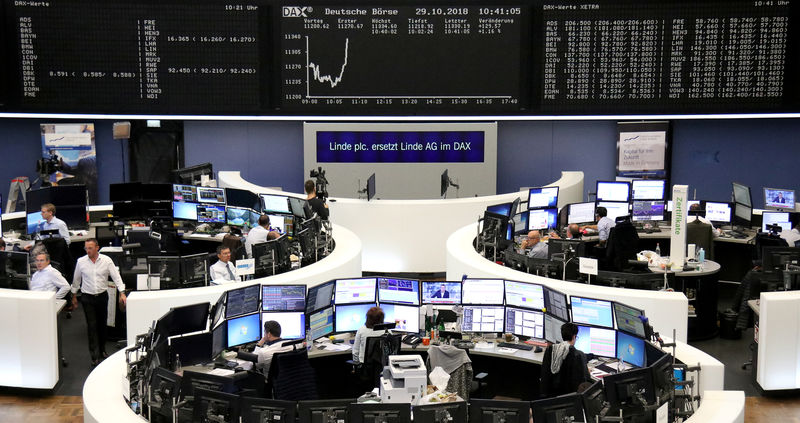By Helen Reid
LONDON (Reuters) - Concern over China’s slowing economy dented U.S. stock futures and kept world stocks under pressure on Monday although European shares climbed thanks to encouraging earnings reports and relief that Italy dodged a ratings downgrade.
The euro, however, fell to a session low after a senior party source said German Chancellor Angela Merkel would not seek re-election as party chairwoman after bruising losses for her Christian Democrats in a regional election in Hesse.
Germany's DAX (GDAXI) was up 0.7 percent by 0929 GMT while the leading index of euro zone stocks (STOXX50E) rose 0.5 percent, boosted by a weaker euro.
Italy's FTSE MIB (FTMIB) led the market with a 1.5 percent gain after Italian bond yields fell sharply to a one-week low following Standard & Poor's decision to leave Italy's sovereign rating unchanged, sparking relief there was no ratings downgrade.
This also boosted Italian bank stocks (FTIT8300) up 2.7 percent.
Despite gains on Monday, investors remained wary of betting the farm on a turnaround in risk.
"The only way I can summarize the core sentiment among the European investors I met is something like 'pretty grim'," wrote Erik Nielsen, group chief economist at UniCredit, in a note to clients.
The MSCI world equity index (MIWD00000PUS), tracking shares in 47 countries, managed a 0.1 percent gain. The index is down 9.3 percent so far this month and has shed $6.7 trillion in market capitalisation since its January peak.
Overnight losses in Asia were largely led by China’s blue-chip index which tumbled more than 3.3 percent.
Chinese data underscored worries of a cooling economy as profit growth at its industrial firms slowed for the fifth consecutive month in September due to ebbing sales of raw materials and manufactured goods.
S&P 500 and Dow Jones Industrial futures declined 0.2 to 0.3 percent after the figures, reversing gains of as much as 0.4 percent earlier. (1YMc1) (ESc1)
Global financial markets have been hit by a range of negative factors from an intensifying China-U.S. trade conflict to tensions in Europe over Italy's budget and tightening monetary policy.
Many indices are already in official correction territory amid heightened worries over corporate earnings and global growth.
Analysts have been downgrading their estimates for European earnings at the fastest pace since Feb 2016, and weak results from internet giants Amazon (NASDAQ:AMZN) and Alphabet (NASDAQ:GOOGL) hurt U.S. stocks at the end of last week.
BOLSONARO WIN BOOST EMERGING STOCKS
Emerging markets stocks (MSCIEF) were a bright spot, gaining 0.1 percent in their first rise in five sessions after far-right candidate Jair Bolsonaro won the second-round runoff in Brazil's presidential election.
Brazil-exposed stocks in Europe climbed as investors cheered the win. Blackrock's Latin American Investment Trust (L:BRLA) London-listed shares gained 7.4 percent while a Germany-listed iShares MSCI Brazil ETF <.MBRABRL.DE> climbed 6.6 percent.
"Our initial assessment for the Bolsonaro administration is that it will have a pro-business stance, focused on enhancing the country's competitiveness," said UBS analysts.
In FX, the dollar index (DXY) rose 0.2 percent to 96.553 after gaining 0.7 percent last week.
The euro (EUR=) fell 0.2 percent to near a two-month low at $1.1381. Sterling
Finance minister Philip Hammond will likely urge his divided Conservative Party to get behind the government’s push for a Brexit deal, or put at risk a long-awaited easing of austerity.
In commodities, oil also reversed early gains to dip on growing worries about Chinese growth. U.S. crude (CLc1) fell 58 cents to $67.01 per barrel and Brent crude (LCOc1) slid 71 cents to $76.89.

Spot gold prices